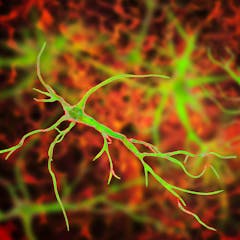
Articles on Brain science
Displaying 1 - 20 of 53 articles

Fluctuating hormones affect the frequency of seizures at multiple times in women’s lives. So we need to tailor their therapies accordingly.

Neuroscientist John Kounios tells The Conversation Weekly podcast about what his new research with jazz musicians revealed about the brain mechanisms of creative flow.

Brain scanners and AI can turn brainwaves into streams of text – but language only captures a tiny fraction of our mental experience.

As Elon Musk’s Neuralink begins inserting chips into human brains, we trace the history of ‘mind reading’ technology and assess the potential risks and rewards

Big names in consciousness research have signed an open letter attacking ‘integrated information theory’ as pseudoscience, sparking uproar.

More invasive devices have prompted new debates about privacy and freedom. But it’s important to keep in mind that other technologies already sense and shape our thoughts, a neuroethicist argues.

New research may upend our understanding of the brain, showing that travelling waves of neuronal excitation dominate the activity associated with our thoughts and feelings.

Listen to the third episode of our series Uncharted Brain: Decoding Dementia via The Anthill podcast.

Listen to the first episode of our series Uncharted Brain: Decoding Dementia via The Anthill podcast.

The physical activity and social connection that take place at recess help children be more engaged once back in the classroom.

From the archive: new research helps unpick clues about the brain’s ability to change its structure. Listen to The Conversation Weekly podcast.

Fetal brains are changing rapidly over the course of pregnancy, but so are the brains of mothers-to-be. Neuroscience research shows one way worry can start taking hold – and a simple way to help.

Plus, how researchers have discovered a biological switch that can turn neuroplasticity on and off in the brain. Listen to episode 13 of The Conversation Weekly podcast.

Smelling odours that aren’t there can be annoying. It can also be a sign of a serious underlying condition.

Adolescents have important developmental work to do. Despite what worried grownups think, taking needless risks isn’t the goal for teens. Being risky is part of exploring and learning about the world.

Harmful proteins spread between connected neurons much like flu spreads through a social network. The finding may provide future opportunities for halting Alzheimer’s.

A new initiative called the International Brain Laboratory is tackling this fundamental mystery of neuroscience in an unusual way.

Hollywood pushes a fantasy version of what neuroscience can do in the courtroom. But the field does have real benefits to offer, right now: solid evidence on what would improve prisons.

Baby’s brains have special activity to help them develop – now researchers have found where some of this happens.

Brain games, learning languages, rowing? Beware of snake oil salesman claiming we know it all.





